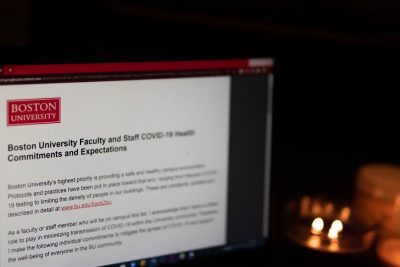
On Friday, Boston University sent faculty and staff a form which they must sign to acknowledge that they understand and comply with the University’s COVID-19 health commitments and expectations. ILLUSTRATION BY LAURYN ALLEN/ DAILY FREE PRESS STAFF
An email sent to Boston University faculty and staff Friday night asked them to sign a form that would confirm their understanding of and commitment to the University’s health guidelines.
The form lists the basic requirements for being on campus, including compliance with isolation, testing and daily symptom attestation. It also indicates that the signee will stay informed and follow any new guidelines that may arise, potentially abruptly.
A failure to meet the commitments will “result in corrective action, up to and including the possibility of suspension or termination of employment,” according to the document.
BU Spokesperson Colin Riley wrote in an email that the form asks faculty and staff to join University administration in committing to a set of expectations intended to maximize the safety of the BU community.
Riley wrote the University is “asking” faculty and staff to sign the commitment to acknowledge that they have read and understand the expectations. He did not specify what would happen if a faculty member declines to sign the document.
All BU employees — and students — who are on campus this Fall are expected to abide by the University’s regulations regarding testing, attestation and face coverings, regardless of whether they are bound by a written commitment or not.
“The specific process through which these requirements will be enforced is on the university’s [Human Resources] website,” Riley wrote. “All of the steps in this process will be done in accordance with the relevant provisions of the non-represented staff handbook, collective bargaining agreements, or the Faculty Handbook.”
An email in late July from Ken Ryan, BU’s director of city relations, to Caitlin Fleishman, chief of staff to Boston City Councilor Ricardo Arroyo, indicated that BU would not ask University students, faculty or staff to sign liability waivers related to COVID-19.
Riley echoed this sentiment, writing in his email that the University is asking members of the BU community to comply with expectations such as wearing face coverings, filling out a daily symptoms survey and viewing University training modules — but that BU does not consider the document a liability waiver.
“The University has asked members of the community to confirm that they understand and will comply with the University’s guidelines for providing a safe and healthy campus environment,” Riley wrote. “This is not a waiver of liability.”
Anna Henchman, an associate professor in the English department, wrote in an email that Friday’s memo was “an attempt to compel agreement with a reopening plan that [she has] vocally objected to.”
“The language of compliance and the threat of ‘termination,’” Henchman wrote, was a reminder that “BU has used such threats to compel graduate students and faculty to return to campus and to teach in person.”
Henchman, who won BU’s Faculty Academic Advising Award in 2019, added that the worst part about BU’s return to campus was seeing its PhD students, whom she “deeply respect[s],” feeling unsafe and unsupported.
“What bothers me most is how much physical and emotional suffering could have been avoided,” Henchman wrote, “if the administration had decided to value the health and well-being of the BU community above a plan that seemed plausible in May but now looks like a disaster unfolding in slow motion.”
BU students were also sent a health and safety commitment document. Those who return to campus must sign the agreement in order to schedule their first COVID-19 test.
While the University claims it has not asked members of the community to sign waivers of liability related to COVID-19, a waiver was required for Weeks of Welcome 2020, a program designed by the Student Activities Office to welcome new and returning Terriers back to campus.
When signing up for the activities via Eventbrite, students were required to sign an acknowledgement and release form in addition to providing their personal information.
“I hereby voluntarily agree to waive, hold harmless and indemnify the Trustees of Boston University… from any and all claims, demands, damages and causes of action of any nature whatsoever arising out of ordinary negligence,” the form reads. “I understand the content of this document, and I execute this GENERAL RELEASE, WAIVER OF CLAIM AND ASSUMPTION OF RISK AGREEMENT of my own free will and accord.”
The waiver does not mention COVID-19. Most events during the program are virtual and held via Zoom, but some require in-person pick-up, such as the “JP Licks Roommate Ice Cream Sundae Kits” and “Paint Night Kits.”
Riley wrote in an email that the University has historically required students to sign liability releases to participate in certain voluntary activities, and this year’s waiver had no relation to COVID-19.
“The release that accompanies registration for the Weeks of Welcome series of events,” Riley wrote, “is a standard release, pre-dating COVID-19, that is used for all ticket sales through Eventbrite for events organized by the Student Activities Office or one of BU’s student groups.”
Students also received an email Aug. 13 outlining compliance expectations and corresponding consequences if a student fails to comply with the University testing and attestation requirements.
Students are expected to complete a daily symptom attestation through Patient Connect, test frequently for COVID-19 at an on-campus testing site and quarantine if deemed necessary by a positive test result or confirmed close contact with a positive individual.
These rules will be enforced by the Dean of Students Office, according to the email, and non-compliant members of the BU community will face administrative and judicial actions from the University, including warning messages from DOS, as well as the possibility of disabling one’s Terrier ID Card and campus WiFi access.
The degree of punishment depends on the offense, and the University will use a strike policy for administering penalties.

















































































































